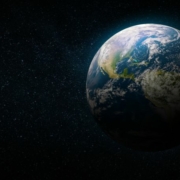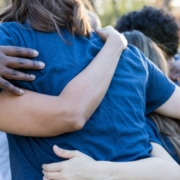Ethical Storytelling, Justice, and the Beatitudes
BY KELLY SWAN | January 30, 2023
Sunday’s Readings
Over the past few months, I’ve been diving into the concept of ethical storytelling as it applies to our work at the Ignatian Solidarity Network. A primary focus of this concept is the need for storytelling to embody the full lived experience of the person whose story is being told—to allow them the agency to tell their full story… yes, their suffering and struggle, but also their joy, their hopes, their full human experience, rather than their caricature as a victim of injustice.
That brings us to Sunday’s Gospel—I’ve always struggled a bit with the Beatitudes. On the surface, I’ve always felt that they were cold comfort. Suffer here and now, but “rejoice and be glad, for your reward will be great in heaven.”
In contrast to the practice of ethical storytelling, when I think about the Beatitudes through a victim lens, they feel insufficient. But when I think about them through the reversed lens of ethical storytelling, I find the embodiment of solidarity. This is exactly what solid, ethical storytelling should do—it should allow us to enter into the story of another person, identify with their human experience, and walk alongside them on the shared path to justice and liberation.

The Beatitudes are core to our work as advocates for justice: “Blessed are those who hunger and thirst for justice: they shall have their fill.” And, “Blessed are those who endure persecution for the sake of justice, for theirs is the kingdom of heaven.”
Surely justice, as named in the Catholic Public Domain Version, named twice in the Beatitudes, is core to our lives as followers of Christ.
John Dear, who has long committed himself to the work of justice and solidarity, said in his book, The Beatitudes of Peace: “Righteousness is not just the private practice of doing good; it sums up the global responsibility of the human community to make sure every human being has what they need, that everyone pursues a fair sense of justice for every other human being, and that everyone lives in right relationship with one another, creation, and God.”
And is this not our call? Not to read the Beatitudes as a path to pitying the suffering and offering weak platitudes. But to hear the call in Jesus’ words to put solidarity into action—to enter into the full story of another and then walk alongside them in pursuit of the justice they, and we all, seek.
Kelly Swan has worked for the Ignatian Solidarity Network since 2016, first as communications director, and now as director of advancement. She grew up in West Virginia and is a graduate of Wheeling Jesuit University. Kelly has worked in parish social ministry, child and family advocacy, community education and organizing, and publishing. She lives in the Cleveland, Ohio area with her children.









We are all unworthy… of food, air, water, God’s love. Once we grasp that it’s all gift from God, not something we created, we can become grateful and, thereby, generous. When we realize we are simply loved, despite our failings, we are free to let God accompany and heal us, and we realize he/she sees us as worthy. “Blessed are the poor,” because they know and accept they’re unworthy. For us privileged, that realization and acceptance can take a long time.
To walk alongside others to seek justice is what I always strive to do. Sometimes such truth telling costs us our jobs. For me advocating justice for others always comes first. And I trust that God will always find me another job.
The concept of ethical storytelling needs to be given its rightful place in our efforts in worldbuilding.